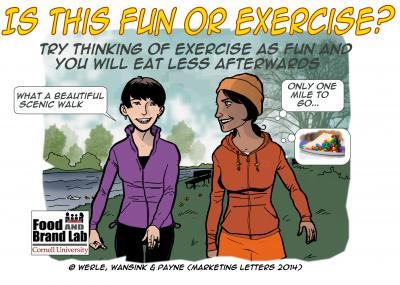If you are having fun rather than doing exercise because you are worried about your health, you'll eat less, according to a new paper which delves into how to market to your brain.
Some people really like to run, or they look forward to exercise. They are probably already thinking about food consumption because they recognize that they did the work. Other people have painted themselves into a psychological corner - they think of exercise and workouts and calories and then eat more afterward. It's well known that most people tend to undercount calories ingested and overcount those in a workout.
The results derive from two studies where adults were led on a 2 km walk around a small lake and were either told it was going to be an exercise walk or a scenic walk. In the first study, 56 adults completed their walk and were then given lunch. Those who believed they had been on an exercise walk served and ate 35% more chocolate pudding for dessert than those who believed they had been on a scenic walk.

"Do whatever you can to make your workout fun. Play music, watch a video, or simply be grateful that you're working out instead of working in the office," recommends Brian Wansink, Director of the Cornell Food and Brand Lab. Credit: Daniel Miller
In the second study, 46 adults were given mid-afternoon snacks after their walk. Those thinking they taken an exercise walk ate 206 more calories of M&Ms, which was over twice as much - 124% more - than those who had been told they were on a scenic walk. "Viewing their walk as exercise led them to be less happy and more fatigued," says lead author, Carolina Werle, professor at Grenoble Ecole de Management in France.
Together, these studies show one reason why people new to exercise programs often find themselves gaining weight. According to Werle, the notion is that new exercisers have a tendency to reward themselves by overeating after their workout.
For beginning or veteran exercisers, the bottom line is this: "Do whatever you can to make your workout fun. Play music, watch a video, or simply be grateful that you're working out instead of working in the office," said Brian Wansink, author and Director of the Cornell Food and Brand Lab. "Anything that brings a smile, is likely to get you to eat less."
Published in Marketing Letters. Source: Cornell Food&Brand Lab





Comments